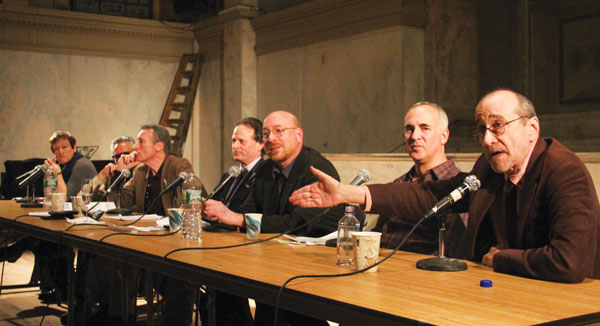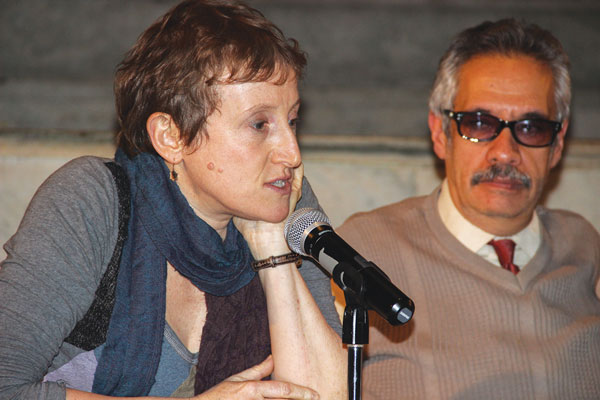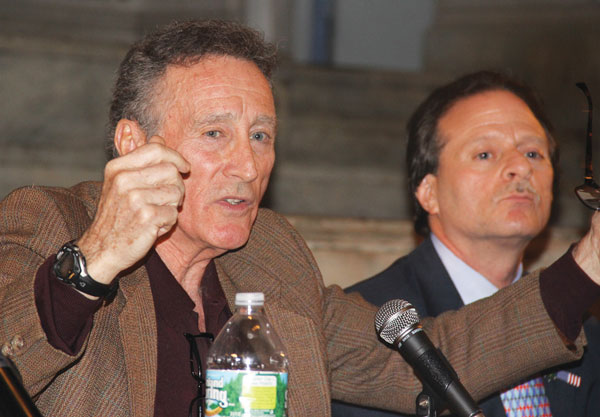
BY ALBERT AMATEAU | A panel of small-business advocates last week issued a call to action to save “mom-and-pop” shops and independent arts groups threatened by the chain stores and bank branches that can afford the city’s sky-high commercial rents.
Sponsored by The Villager newspaper and the Village Independent Democrats club, the Thurs., March 5, forum at Judson Memorial Church, on Washington Square South, attracted nearly 100 neighbors who braved snow and frigid temperatures to hear about potential solutions to save small businesses.
Nadine Hoffmann, president of V.I.D., gave opening remarks, welcoming the audience and the panel of six experts.
The panel was moderated by Lincoln Anderson, The Villager’s editor in chief.
“There have been a couple of other local forums over the past year on similar themes,” Anderson noted at the outset. “But they haven’t always offered solutions because, well, these are very difficult issues. What sets this forum apart is that it will attempt to offer a solution. There is a bill sitting in the City Council, the Small Business Jobs Survival Act — right now — that advocates on this panel say is the solution.”
Anderson added that the reason there were no politicians on the panel was precisely because the S.B.J.S.A. bill has languished for decades, constantly blocked from coming up for a vote by the political powers that be.
The advocates all agreed that helping small businesses survive will require political will, but that it will not be easy.
“The main problem is that business owners have no rights to negotiate lease renewals with landlords at reasonable rents,” said Steve Null, a former member of the Small Business Advisory Board in the Dinkins and Giuliani administrations.
Null was the author in 1986 of a bill introduced by then-Councilmember Ruth Messinger, the Small Business Jobs Survival Act, or S.B.J.S.A. A current version of that bill is before the City Council. The measure would regulate only the commercial rent renewal process and would encourage good-faith negotiations. The bill calls for mediation to bring parties together, followed by binding arbitration if there is no agreement. If a landlord is offered a higher rent, the existing tenant would have the chance to match it. Tenants in good standing would have the right to lease renewals of 10 years.
“But in 30 years we’ve had bills that go nowhere in the City Council. No bill ever made it to the mayor’s desk,” Null said, calling for public pressure on Mayor de Blasio and City Council Speaker Melissa Mark-Viverito to move the current version, introduced last year, to adoption. “This is the end of the line,” Null said. “They [de Blasio and Mark-Viverito] were for it when they were candidates. Now they’re silent.”
“Arbitration is the best option,” Steven Barrison, a lawyer active in commercial rent negotiations for 25 years, said, referring to the S.B.J.S.A.
While commercial rent control has no chance, given the real estate climate in the city, it did exist 50 years ago.
“From 1945 to 1963 there was commercial rent control in the city, with a final arbitration step,” said Barrison, co-chairperson of the Coalition to Save New York City Small Business. “During those 18 years, not one landlord could prove he was denied reasonable rent.”
What has always stopped the S.B.J.S.A. from coming up for a vote in the City Council? Anderson asked.
Barrison held up his hands, making the Johnny Manziel money sign with his fingers — a gesture he would repeat several times during the night. And yet, Barrison said, the politicians are actually more afraid of the popular will of the voters than they are influenced by real estate’s big bucks.
Alfred Placeras, a small-business advocate and founder of the New York State Hispanic Chamber of Commerce, declared, “There should be disincentives to keeping stores vacant for years.”
Placeras noted that landlords often refuse small-business tenants lease renewals at any rent. He remarked that stores left vacant for a long time have a devastating impact on neighboring small businesses.
Panel members were critical of other options.
“A zoning solution is 15 years too late,” said Null. He noted that changes in zoning to help small businesses would apply to new commercial tenants and leave old tenants unaffected.
Nevertheless, Null and Barrison cited a 2004 San Francisco measure restricting the concentration of chains and franchises. However, the San Francisco ordinance, which provides for community input and final approval by the city, would have most effect on new locations but leave commercial tenants unprotected.
A property-tax credit for landlords who voluntarily limit rent increases for small businesses upon lease renewal was a suggestion the panel found to be weak because it would be voluntary. New York City is currently urging the State Legislature to pass a law along these lines.
The idea of creating a small-business retention task force provoked only derision.
“Mayor Koch founded a small business task force that we called the ‘Limousine Commission’ because it was made up of bankers and real estate interests,” Null recalled.
Mark Crispin Miller, a media studies professor and president of N.Y.U. Faculty Against the Sexton Plan — the group leading the legal fight against the university’s massive South Village expansion project — framed the discussion in the context of the “big picture.”
“The city is vanishing right before our eyes,” said Miller, warning that before long the Big Apple will look like Dubai.
He cited “The Assassination of New York,” Robert Fitch’s 1996 book that details the attack on small businesses and manufacturing for the benefit of the FIRE (finance, insurance and real estate) economy that started as far back as the 1920s. We are now facing that grand scheme’s end game, he said.
“This can be changed — by the people, the voters,” Miller said, adding, “There has to be a tremendous effort to organize to make politicians understand that this cannot continue.”
Miller noted that the fight against the N.Y.U. expansion got a boost last month when the Court of Appeals, New York State’s highest court, agreed to hear an appeal of an Appellate Division ruling that had overturned a lower court decision that part of the expansion plan was invalid.
Rounding out the panel and providing a landlord’s perspective was Robert Perl, president of Tower Realty, whose business is centered in the East Village. Perl warned the other panel members that any solution could have unintended consequences.
He also said that rent is often only 10 percent of a restaurant’s costs, for example.
“We have to ask ourselves what we are trying to preserve,” Perl added, noting that mom-and-pop businesses keep changing hands, making it impractical to lock in leases for 10 years.
But the other panelists were eager to rebut his statements, all of them arguing forcefully that lease renewals are unquestionably the deciding factor on whether small businesses survive or go under.
Yet, Perl said he couldn’t see any easy answers.
“New York is a magnet for money from all over the world and I don’t see that anything will stop it,” he said, implying that rising commercial rents are inevitable.
The only solution he could offer was that people should patronize and support the small businesses that they value.
Also on the panel was Jenny Dubnau, representing the Artist Studio Affordability Project.
“We want to make common cause with small businesses,” Dubnau said. “Last year over 100 artists lost their studios in Brooklyn.”
At the same time, she said, artists are used, unbeknownst to them, by developers as the leading edge of gentrification.
During the event’s question-and-answer session, audience members responded to the problems of small-business owners and offered some suggestions of their own.
Jeffrey Rowland supported Placeras’s call for disincentives to keeping property vacant.
“There should be a punitive vacancy tax,” Rowland offered, emphasizing the word “punitive.”
Audience members applauded their approval of the idea. However, Barrison said such a tax likely would be difficult to implement.
Lorcan Otway, owner of Theater 80, on St. Mark’s Place, said that the 67 percent rise in real estate taxes over the past 10 years is jeopardizing the continued existence of small theaters in the neighborhood. Mayor de Blasio’s projection of another 19 percent increase in the next four years will make matters worse, he warned.
Jean Grillo, Democratic district leader in Tribeca, agreed that saving small businesses was an important political goal.
“You should talk to your councilmember,” she advised.
Several audience members wondered why small businesses in Downtown neighborhoods have not posted signs in their stores promoting the Small Business Jobs Survival Act.
The answer from the panel was that landlords are very punitive, implying that there would be payback for posting such signs.
“I’ll put one up six feet high,” said Jim Drougas, owner of Unoppressive, Non-Imperialist Bargain Books, on Carmine St.
Judy Callet said locals have heard that “a hedge fund guy” who has bought the building with the Avignone health and beauty care shop on Bleecker St. near Sixth Ave., intends to jack up the space’s rent from $20,000 to $60,000 a month. Unable to afford that, Avignone will close in a few weeks.
Perl, who said he used to patronize the pharmacy at Avignone before it relocated to CVS nearby, said he was shocked to hear that astronomical sum.
“We need a movement, like the one Jane Jacobs started,” declared Ann McDermott, an East Village resident who said she is affiliated with the Jeremiah’s Vanishing New York blog.
Another audience member, a veteran of Occupy Wall Street’s 2011 Zuccotti Park encampment, said that N.G.O.’s like the Regional Plan Association need to be looked at in terms of how they’re working behind the scenes to direct the city’s future course.
Karen Loew, Greenwich Village Society for Historic Preservation director for the East Village and special projects, said that G.V.S.H.P. is already on board. The group has previously held a forum on preserving local restaurants.
The organizer of last Thursday’s forum was Sharon Woolums, a V.I.D. member. She has written a half-dozen columns advocating for the S.B.J.S.A. that have been published in The Villager over the past two years.

The evening’s last word belonged to her.
“We are now armed with knowledge,” Woolums said, “and knowledge is power — the power to make changes.”
A couple of hardy aides of local politicians made it to the forum on the snowy and cold evening. One of them afterward told The Villager that the S.B.J.S.A. currently only has 14 supporters in the City Council, but needs 34 of the 51 councilmembers to get behind it, since that would make it veto-proof if the mayor doesn’t like the bill.

“That’s not true,” countered Null, indicating that the long-stymied legislation should, at last, be allowed to come up for a vote.
In addition, at the forum, Barrison revealed yet another looming threat to small stores. He said that Walmart, while having given up on trying to bring big-box stores here, hasn’t given up, by any means, on conquering New York City. The chain plans to open up at least 120 “baby Walmarts” here by 2017, with an ultimate goal of 150, he announced.

These “baby Walmarts,” he said, would be housed in smaller spaces than the chain usually operates, ranging from 5,000 square feet to 10,000 square feet, and would be in all five boroughs. For these smaller stores, Walmart would break out the various departments included in its big-box stores, with one “baby Walmart” housing a pharmacy, for example, another a food store, another an electronics shop and so on, or combinations of a few different departments, he said.
— With reporting by Lincoln Anderson






























